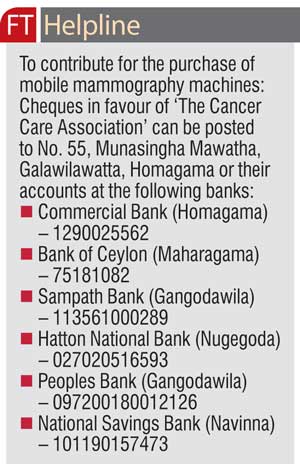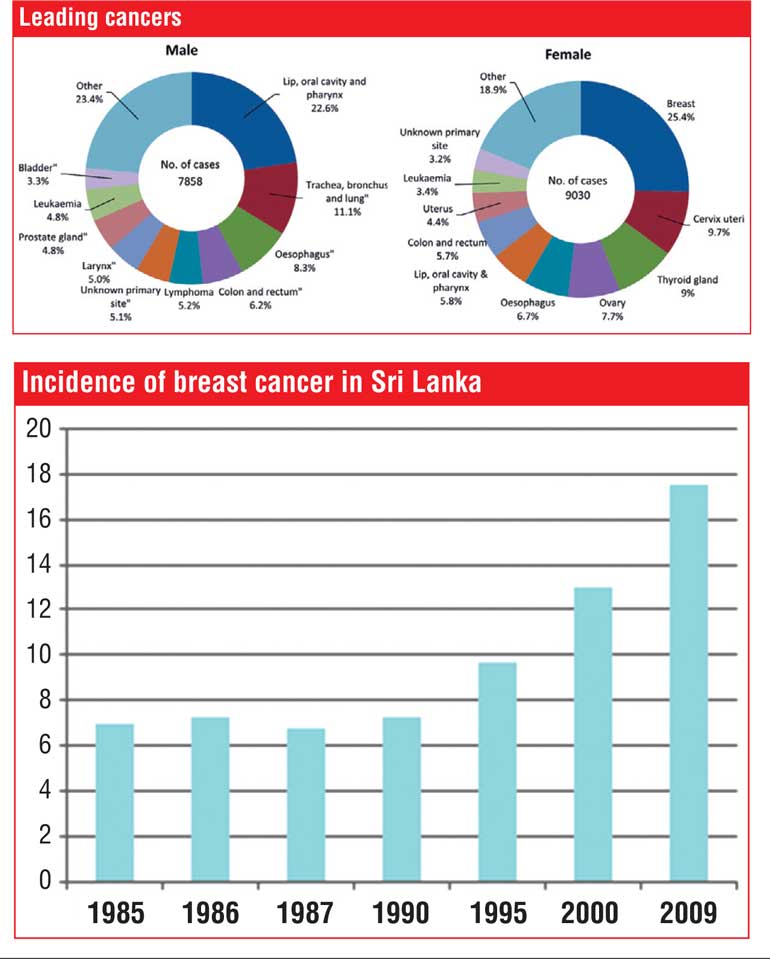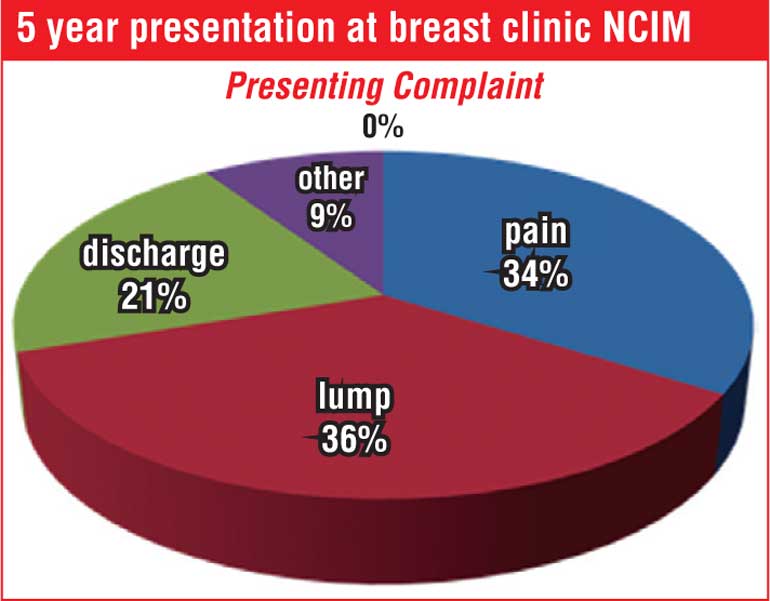Thursday Feb 26, 2026
Thursday Feb 26, 2026
Wednesday, 19 October 2016 00:01 - - {{hitsCtrl.values.hits}}
 From left: The Kingsbury Director/Head of Marketing and Sales Denesh Silva, Consultant Oncological Surgeon Dr. Ranga Perera, The Kingsbury Director Communications Dinithi Somaratne, Cancer Care Association of Sri Lanka President Dr. Samadhi Rajapaksa, Breast Cancer Surgeon Dr. Indrani Amarasinghe, Senior Consultant Oncologist Dr. Jayantha Balawardena and Consultant Oncological Surgeon Dr. Asela Senanayake – Pic by Lasantha Kumara
From left: The Kingsbury Director/Head of Marketing and Sales Denesh Silva, Consultant Oncological Surgeon Dr. Ranga Perera, The Kingsbury Director Communications Dinithi Somaratne, Cancer Care Association of Sri Lanka President Dr. Samadhi Rajapaksa, Breast Cancer Surgeon Dr. Indrani Amarasinghe, Senior Consultant Oncologist Dr. Jayantha Balawardena and Consultant Oncological Surgeon Dr. Asela Senanayake – Pic by Lasantha Kumara
By Fathima Riznaz Hafi
Breast cancer, contrary to common belief that it is a death sentence, is in fact 100% curable if early intervention is sought. Getting screened early would enable detection of cancer at its initial stages when the cells have not spread far and if the patient is prompt in seeking treatment upon diagnosis, the cancer cells can be removed more easily, with minimal surgical intervention, allowing the  resumption of a normal life thereafter.
resumption of a normal life thereafter.
When women are informed of risk factors and taught to identify symptoms, they would then be able to take the necessary steps and make better decisions when faced with the issue. Lack of knowledge on the disease indeed has morbid consequences which is why awareness is of high importance.
In this light, ‘The Kingsbury Nurtures’ (CSR arm of The Kingsbury) joins hands with the Cancer Care Association (CCA) to organise an awareness drive this month, which is Breast Cancer Awareness month. The Kingsbury Nurtures notes that women play a vital role as caregivers and at the same time are significant contributors to the economy. Breast cancer is most prevalent among urban women and yet it is this segment who delays screening due to their busy lifestyle. The Kingsbury Nurtures is working closely with the Cancer Care Association to bring about a change and their main goals are to spread the word that breast cancer can be cured if detected early through regular screening.
“In Sri Lanka annually 2,500 new cases are reported – that’s one-fourth of all female cancers diagnosed in the country and we are talking about our mothers, sisters and daughters; so it’s our responsibility to get more awareness of breast cancer – not only this month but every day,” said Cancer Care Association Founder Dr. Samadhi Rajapaksa, speaking at a media briefing held recently at The Kingsbury where a panel of senior cancer and breast cancer specialists had gathered to share their views.
Alongside him, urging the public to wage a war against cancer was Breast Cancer Surgeon Dr. Indrani Amarasinghe. She spoke of the many initiatives that have been taken to fight the battle against cancer such as board certifying medical oncology and surgical oncology, setting up free cancer clinics and tertiary centres island-wide and training mid-wives to reach rural women to teach them self-examination techniques but added that these won’t work if women do not make use of them and therefore stressed the importance of making them aware of the facilities available to help them.
“As the years went by it emerged that breast cancer is the commonest cancer among women in Sri Lanka. Women present mainly with a lump or what they think is a lump and they also present nipple discharge (which is important – don’t ignore it) and breast pain. Breast pain affects them sexually, they fear that it is cancer but they go about their daily work with everybody saying ‘don’t worry it’s nothing’ and by the time they come to us they are pretty much a wreck because of this fear that they have cancer. It can all be avoided if they come to see us early,” she added.
The highest incidence of breast cancer is indicated at the 50-60 age-group; therefore it was strongly recommended that women undergo mammogram tests before then (preferably by 40) to rule out possibilities and she added, “Breast cancer is not a death sentence – it can be completely removed. It takes up to seven years for a mutated cell to become a lump that you can feel – that’s a long time – so you have plenty of time to focus on screening, mammography and special clinics so that we can pick it up!”
Symptoms
Senior Consultant Oncologist Dr. Jayantha Balawardena mentioned some of the basic symptoms of breast cancer adding that sometimes the cancer can come without any symptoms but it is rare. “Most of the time they present with a lump and it must be remembered that ‘a lump in the breast is a cancer until proven otherwise’! You can’t just assume it’s harmless – it must be  comprehensively investigated,” he stressed.
comprehensively investigated,” he stressed.
Other symptoms are a change in the level of the breast, skin dimpling, bleeding of the nipple (very significant) and retracted nipple (if recent onset).
“Ideally you should get your first mammography at the age of 40 and if that result comes out normal, you should get the second one done after three years. Every woman after the age of 20 should know how to examine her breast (self-breast examination). If you just go to Google and type ‘self-breast examination’, it will take you through the entire process. It is very simple and very important. After the age of 40 every woman should go for at least a single breast examination by a qualified clinician,” he said.
Mobile mammography machines
Referring to examples in the UK and US where screening is made compulsory and regular screening programs are conducted, it was suggested that Sri Lanka make screening compulsory too. “What Sri Lanka lacks is mammography machines – because they are expensive! We have them in our oncology centres and general hospitals but what we need is a mobile unit – that’s what the UK has – a mobile machine to go to the most remote village or estate and check women between the ages of 50-60,” said Dr. Amarasinghe.
In a bid to reach poor women in rural areas, realising that it is unlikely that they would come for help, funds are being raised for the purchase of mobile mammography machines so the screening could be taken to them, for free.
The Cancer Care Association requests financial assistance from the public as mammography machines are very costly and they are lacking in funds.
Radiation
Mammograms are one of the most important weapons we have to fight our battle against cancer; however, noting the fear that some women have of mammography machines due to the radiation as it is known that radiation can cause cancer Dr. Balawardena said that the level of radiation is low and the benefit outweighs the risk. “We don’t do the test for women below the age of 35 because immature breasts are more radio-sensitive than mature breasts and also the breasts are denser at that age, making it difficult to detect the cancer,” he said.
“The new digital mammograms however give out very little radiation and though it is more costly than the regular mammogram machine, the price is not exorbitant. The digital machine is used in some private hospitals,” he added.

Breast conservation surgery
Most people do not go to the doctor in the fear that the breast will be removed. They need to know that when the cancer is detected early, breast conservation can be carried out, thereby preserving the breasts. “It is very important for them cosmetically as well as psychologically because after doing the mastectomy about 50% of women are psychologically withdrawn. That is the important thing in detecting cancer early,” Dr. Balawardena said.
“Having breast cancer is not the end of life. Worrying about the stigma attached to cancer is probably what keeps people from coming for early detection. In Sri Lanka many women are getting mastectomies because they are not detecting sooner. If they come early there is no need of mastectomy,” said Consultant Oncological Surgeon Dr. Asela Senanayake.
Dr. Senanayake, explaining how they would surgically manage breast cancer, said: “It is essentially a primary surgical treatment and after we attend to the surgery, according to the result we will decide whether this lady requires further treatment and we have quite a few options in the form of chemotherapy, radiotherapy and hormone treatments. Essentially the surgical treatment for breast cancer is to treat the breast and the next level of lymph nodes that will receive cancer cells in the armpit.”
During a mastectomy the whole breast is removed but with breast conservative surgery, only the lump is taken out with a margin of normal breast tissue and then the axillary lymph nodes are treated separately. The idea is for them to assess whether the lymph nodes in the axilla have any tumour deposits and that will determine whether they are going to operate on the armpit or not.
He added however, “This particular procedure is very effective but that is if the size of tumour is relatively small. These types of procedures are very easy to perform if we can detect cancer at an early stage – where it is very small – which is where our screening programs would be very beneficial.” “More than 25% of presentations are with a palpable lump; if we can shift that percentage to screening level presentation, we would be in a much better position to perform breast conservative surgery. 80-90% of breast cancers in the UK are diagnosed when they are not palpable and that is thanks to the very comprehensive screening program of having three yearly mammograms,” he said.
Breast reconstructive surgery
“If the tumour is in several parts of the breasts and we cannot offer breast conservative surgery, we are compelled to offer a surgery where the entire breast has to be taken out. But there again we have moved on – we can replace the breast tissue with either an implant or with natural flaps that are available in the body. We take some tissue from the tummy and also from flaps in the back and shift it to where the breast tissue was. This will bring out the same contour as the natural breast – the whole idea is to try and hide the scars so that she can have a normal-looking breast at the end of the surgery.”
This is the type of surgery that they commonly do because the cost of implants at the moment is very high. It is usually done at the same time as the cancer resection surgery. At the end of the surgery the patient would have had all of the cancer-containing tissue taken out but leaves with a breast that is almost equal to the natural breast that she had.

Prevention is better than cure
Dr. Balawardena noted that we talk of early detection and treatment but the best approach would be prevention! Identifying the causes of breast cancer and taking the necessary precautions would be the best way to stay away from it.
There are certain factors that cannot be prevented, like genetic factors but there are some other factors that can be prevented, he said.
He discouraged late marriages as they result in late pregnancies.
“In the ‘40s, ‘50s and ‘60s we did not see that much of cancer in Sri Lanka but now it is alarmingly increasing; one reason is late marriages. It is very important that a woman gets married and has the first child before the age of 30 and breastfeeds that child for a length of time as it is a fairly good protection against breast cancer.
“Another reason is diet: We all know Sri Lankan ladies are very pretty – until they get married and until they have two or three children; then they just give up. It is very important to maintain your Body Mass Index because not only breast cancer but also ovarian cancer, bowel cancer, pancreatic cancer and thyroid cancer – are all directly related to obesity,” he said adding that regular exercise and avoiding alcohol are also important.
Prevention is indeed important but we should still be cautious of the possibility and therefore it was unanimously agreed and reiterated several times by each speaker at the media briefing that early detection is the best way to tackle the situation and if more women are made aware of the significance of seeking treatment early, mastectomies, psychological repercussions and loss of life could be avoided. They stressed that women should be encouraged to fight their fears, ignore myths and come forward to get screened.
A significant factor preventing women from seeking treatment is their belief in certain myths surrounding breast cancer. Consultant Oncological Surgeon Dr. Ranga Perera spoke on some of these myths, explaining why they are not true: